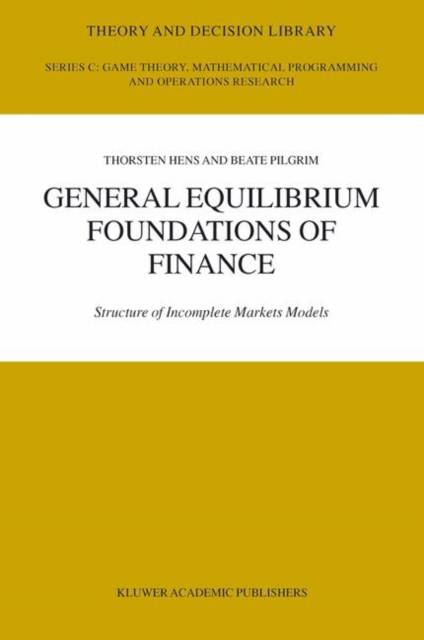
Je cadeautjes zeker op tijd in huis hebben voor de feestdagen? Kom langs in onze winkels en vind het perfecte geschenk!
- Afhalen na 1 uur in een winkel met voorraad
- Gratis thuislevering in België vanaf € 30
- Ruim aanbod met 7 miljoen producten
Je cadeautjes zeker op tijd in huis hebben voor de feestdagen? Kom langs in onze winkels en vind het perfecte geschenk!
- Afhalen na 1 uur in een winkel met voorraad
- Gratis thuislevering in België vanaf € 30
- Ruim aanbod met 7 miljoen producten
Zoeken
General Equilibrium Foundations of Finance
Structure of Incomplete Markets Models
Thorsten Hens, Beate Pilgrim
€ 259,45
+ 518 punten
Uitvoering
Omschrijving
The purpose of this book is to give a sound economic foundation of finance. Finance is a coherent branch of applied economics that is designed to understand financial markets in order to give advice for practical financial decisions. This book argues that for a sound economic foundation of finance the famous general equilibrium model which in its modern form emphasizes the incompleteness of financial markets is well suited. The aim of the book is to demonstrate that financial markets can be meaningfully embedded into a more general system of markets including, for example, commodity markets. The interaction of these markets can be described via the well known notion of a competitive equilibrium. We argue that for a sound foundation this competitive equilibrium should be unique. In a first step we demonstrate that this essential goal cannot of be achieved based only on the rationality principle, i. e. on the assumption utility maximization of some utility function subject to the budget constraint. In particular we show that this important lack of structure is disturbing as well for the case of mean-variance utility functions which are the basis of the Capital Asset Pricing Model, one of the cornerstones of finance. The final goal of our book is to give reasonable restrictions on the agents' utility functions which lead to a well determined financial markets model.
Specificaties
Betrokkenen
- Auteur(s):
- Uitgeverij:
Inhoud
- Aantal bladzijden:
- 299
- Taal:
- Engels
- Reeks:
- Reeksnummer:
- nr. 33
Eigenschappen
- Productcode (EAN):
- 9781402073373
- Verschijningsdatum:
- 31/01/2003
- Uitvoering:
- Hardcover
- Formaat:
- Genaaid
- Afmetingen:
- 162 mm x 251 mm
- Gewicht:
- 644 g

Alleen bij Standaard Boekhandel
+ 518 punten op je klantenkaart van Standaard Boekhandel
Beoordelingen
We publiceren alleen reviews die voldoen aan de voorwaarden voor reviews. Bekijk onze voorwaarden voor reviews.









